 Hardware Tutorial
Hardware Tutorial
 Hardware News
Hardware News
 MIUI reaches the end, Xiaomi's self-developed system breaks ground
MIUI reaches the end, Xiaomi's self-developed system breaks ground
MIUI reaches the end, Xiaomi's self-developed system breaks ground
In 2010, Xiaomi released their first product, MIUI, which was the first third-party mobile operating system that was deeply optimized, customized, and developed based on the Android system. In the past 13 years, MIUI has become more and more popular. The more perfect and humanized it is, the more "bloated" it will naturally become.
In the early years, MIUI can be said to be a third-party Android operating system that integrates smoothness and ease of use. However, in recent years, its evaluation has changed somewhat. Users believe that today’s MIUI has too many functions, stuck animations, and unsmooth operations. It is no longer the first echelon among third-party operating systems.
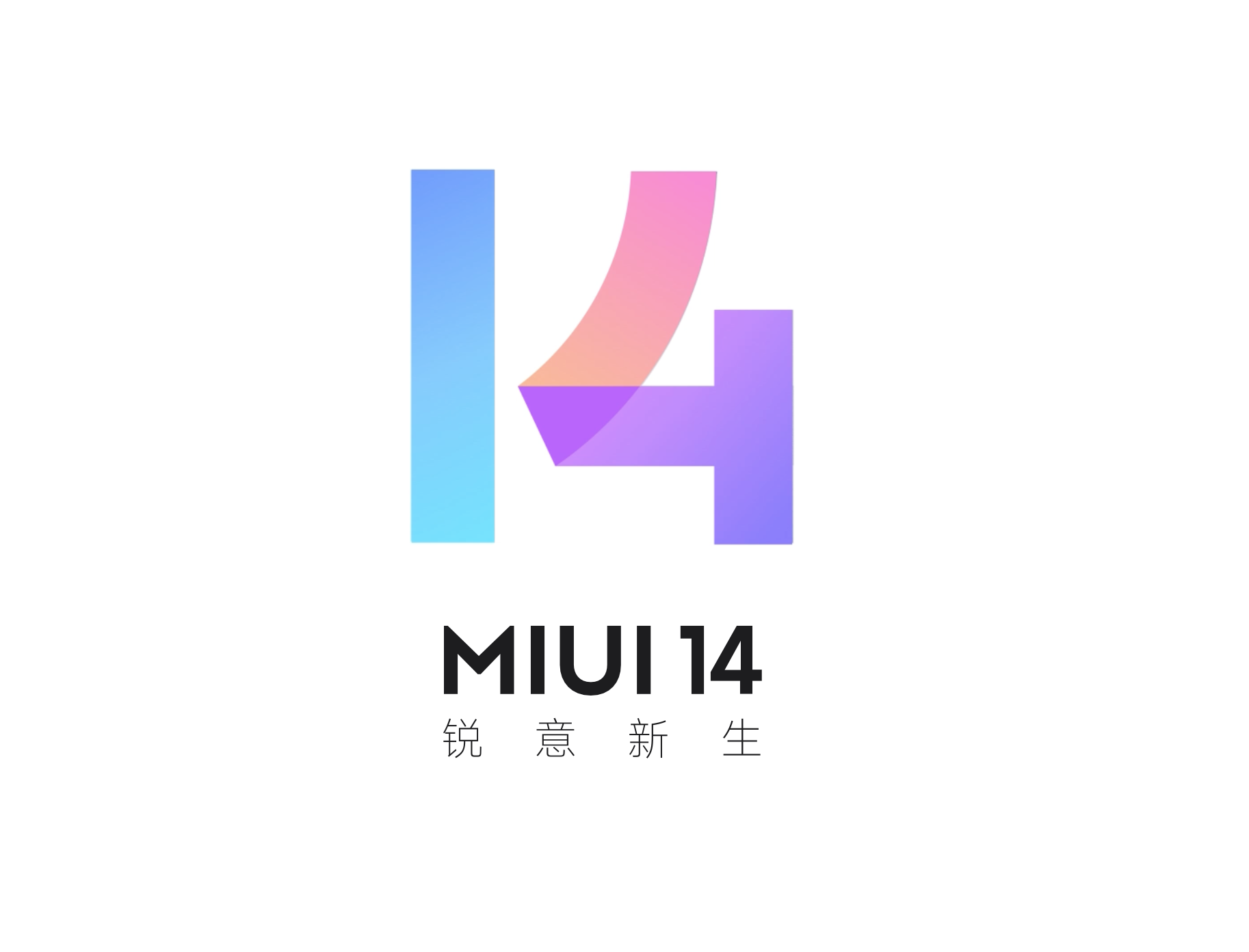
(Photo source: Xiaomi official website)
In the final analysis, it is still the first two The current generation of MIUI (MIUI 12 and MIUI 13) spans too much. Too many new codes and features are crammed in at once, and the optimization is not in place, resulting in excessive load on the phone and a very poor user experience. Although MIUI 14 provides timely remedial measures, it deletes many useless features in a drastic way, and reduces the number of system-level applications that cannot be uninstalled to 8. These are key elements for streamlining the system.
However, trying to restore the reputation of MIUI with these remedial measures is still a bit weak. Perhaps Xiaomi needs to take bigger actions to completely dispel the market's trust in MIUI. worries.
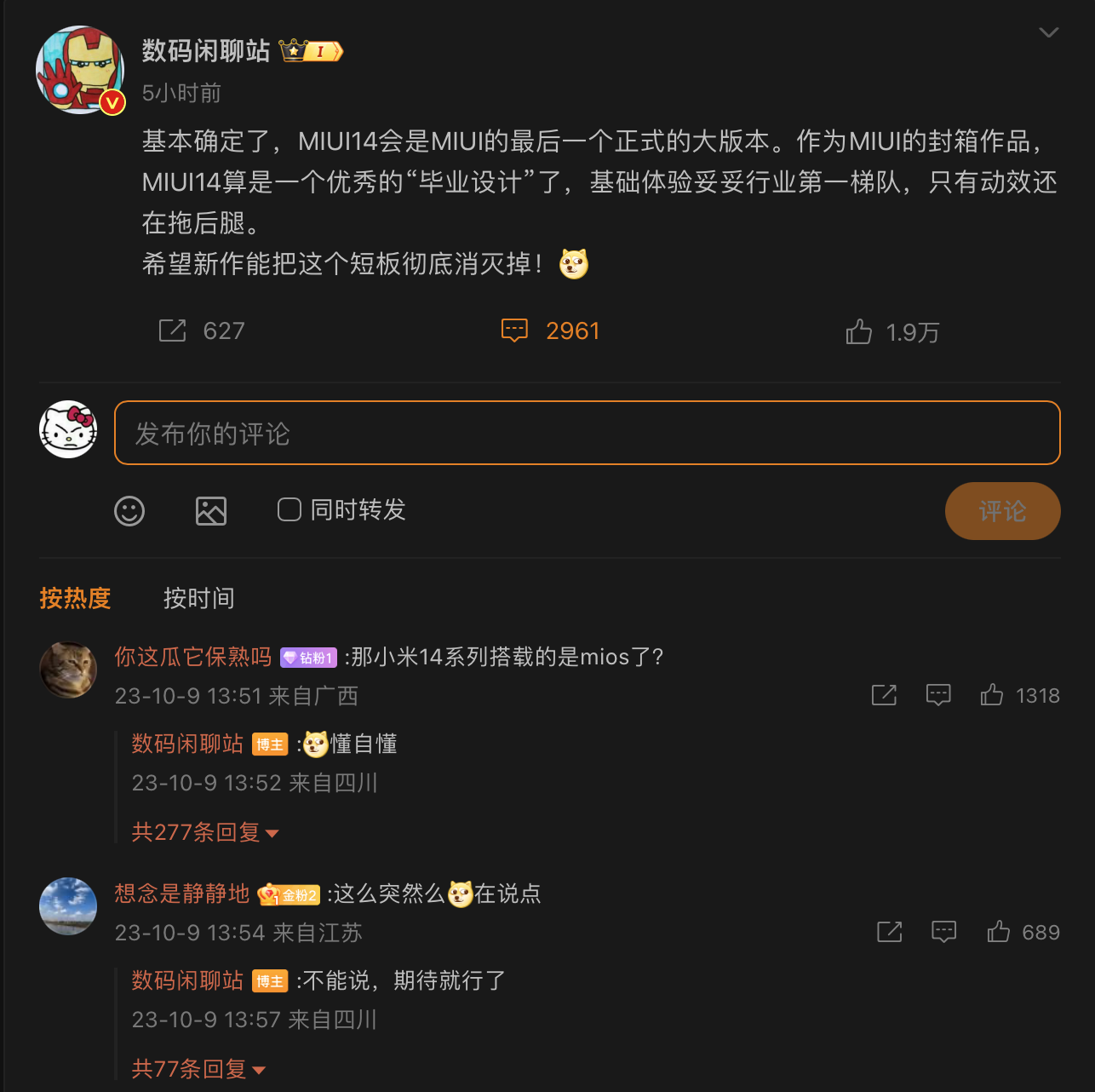
(Picture source: Weibo screenshot)
By coincidence, just Recently, the well-known blogger @digitalchat.com said that MIUI 14 is the final work of MIUI, and there will be no major version updates in the future. As for the reason, you can probably guess that Xiaomi is really going to release its own operating system. .
MIOS, a complete makeover?
According to various current revelations, MIOS is likely to be consistent with Huawei Hongmeng’s release strategy, that is, it will not make major changes to the operating logic. After all, every time Changes may affect the user experience, so making changes slowly is the best policy. So what we can be sure of is that MIOS will not change much compared to today's MIUI. For example, the more usable global small windows, App pop-up messages, portals, etc. are basically optimized and improved based on the previous ones.
I don’t know if you still remember that at Lei Jun’s annual speech event some time ago, Lei Jun announced a series of future actions regarding Xiao Ai’s classmates, such as converting Xiao Ai to Students are connected to the large model (MIUI 14 has started internal testing), so that the intelligent assistant Xiaoai has stronger understanding and knowledge reserves. Simply put, it can understand human speech better.
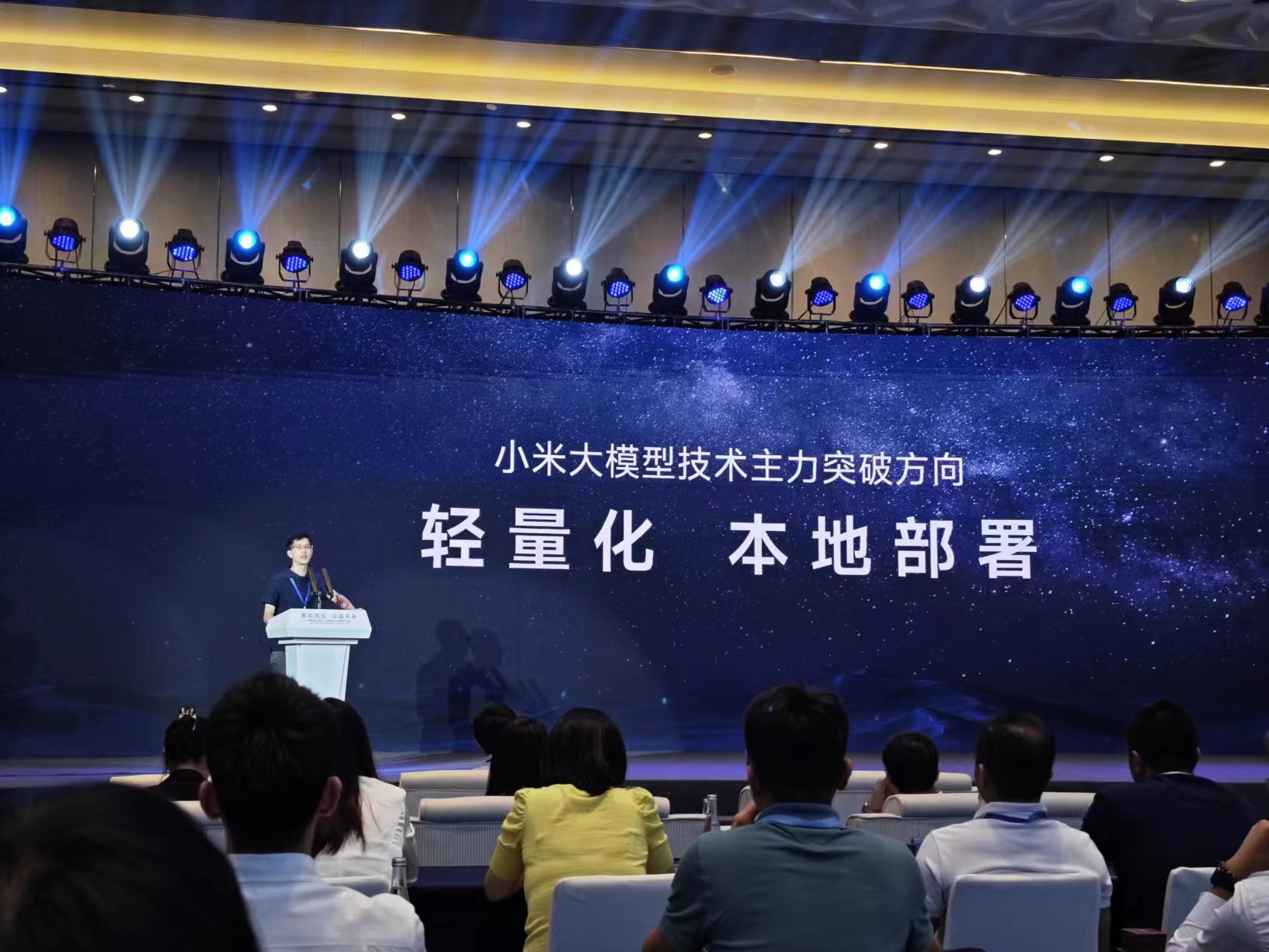
(Photo source: Photographed by Lei Technology)
Also in the icon , animation, and interaction will also have certain small updates to make the entire operating system operate more harmoniously, instead of having a serious sense of fragmentation in some scenes like today.
Interestingly, MIOS is very likely to adopt a self-developed microkernel architecture. Compared with mainstream macrokernel designs, microkernels have high overall flexibility, easy deployment and The three major advantages of high customizability can be said to be the "only way" for third-party operating systems to switch to self-developed systems. However, the disadvantage of doing so is that it may cause changes in the underlying system and may be lacking in compatibility.
But as a brand new system version, MIOS will definitely be compatible with Android applications in the early stage, otherwise it will be difficult to convince Xiaomi users to continue using their phones. At the same time, the Xiaomi MIOS system will make its debut at the end of the year and will initially be used in AIoT smart devices and large terminals, which will bring a smoother and more efficient user experience to Xiaomi users. Therefore, in the next market, the future development of Xiaomi MIOS is still very promising. It depends on how Xiaomi develops its efforts.
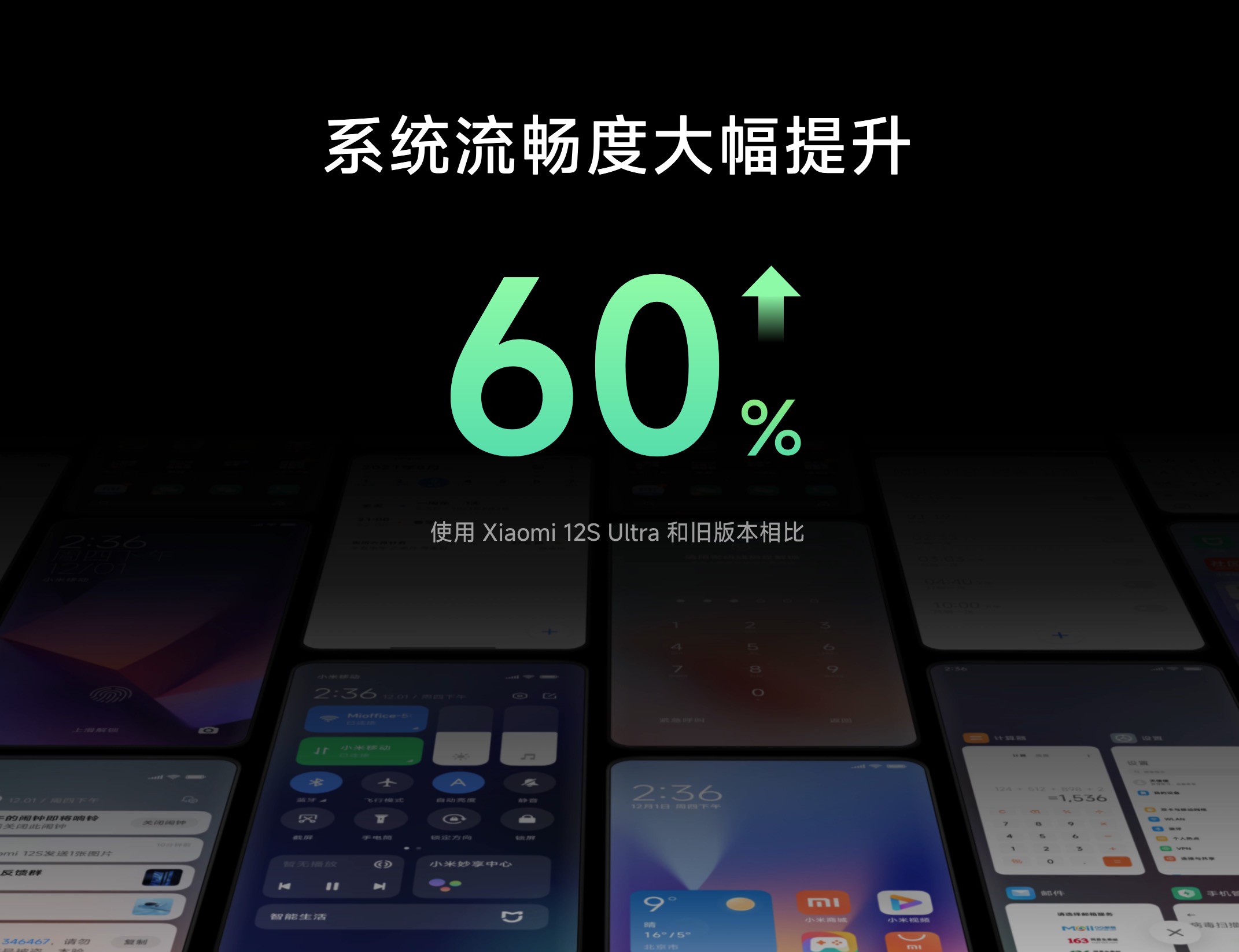
(Photo source: Xiaomi official website)
The last and most important thing One point is that the real focus of MIOS must be to enhance ecological stability and compatibility. It will be deeply integrated and linked with current Mijia ecological devices, making the experience of using mobile phones to control various Mijia products more convenient and faster. However, it is still unrealistic to build an independent operating system based on this alone. In Xiaolei’s view, the emergence of MIOS is precisely to pave the way for Xiaomi Auto.
There are more and more rumors about Xiaomi cars recently. Some external sources say that Xiaomi cars have entered the trial production stage. Some people also said that Xiaomi cars will be officially released this year and mass production will officially begin in 2024. This time point coincides with the leaked MIOS, and it is difficult for Xiao Lei to connect the two. Therefore, Xiao Lei boldly guessed that Xiaomi Auto's car-machine system is a major focus of MIOS. Perhaps the car will be linked with a number of Xiaomi devices such as Xiaomi phones, headphones, and tablets in the hands of users. Turning the phone into a car system is also a mainstream solution for many new energy manufacturers.
According to the news from digital chat sites and the release time of MIUI in previous years, MIOS should make its debut at the end of the year, and will initially be put on various AloT devices and large Test the water on the terminal, and wait until the overall experience is stable before launching various smart terminals one after another. Therefore, Xiaolei speculates that its official release time should originally be the day of MIUI 15, which is around December 2024.
# Self-developed systems, the only way for domestic mobile phone manufacturers?
Obviously, Xiaomi is not the first manufacturer in the mobile phone market to research a self-developed operating system. Alibaba and Tencent have also developed their own operating systems before, but Everyone knows the outcome. In the end, only Huawei and Hongmeng stood out. This shows how difficult it is to develop a self-developed operating system. Even if it is developed, it will be difficult for consumers to accept it. After all, what reason do consumers have to give up their Android/Apple phones to use your fledgling new system?
But domestic mobile phone manufacturers are different. They have a huge user base. As long as it does not affect users’ daily operations and brings more novel and practical functions, it is still It allows consumers to willingly switch to operating systems developed by mobile phone manufacturers. So the question is, now that the Android system is very stable and complete, why do manufacturers spend time and energy developing an operating system?
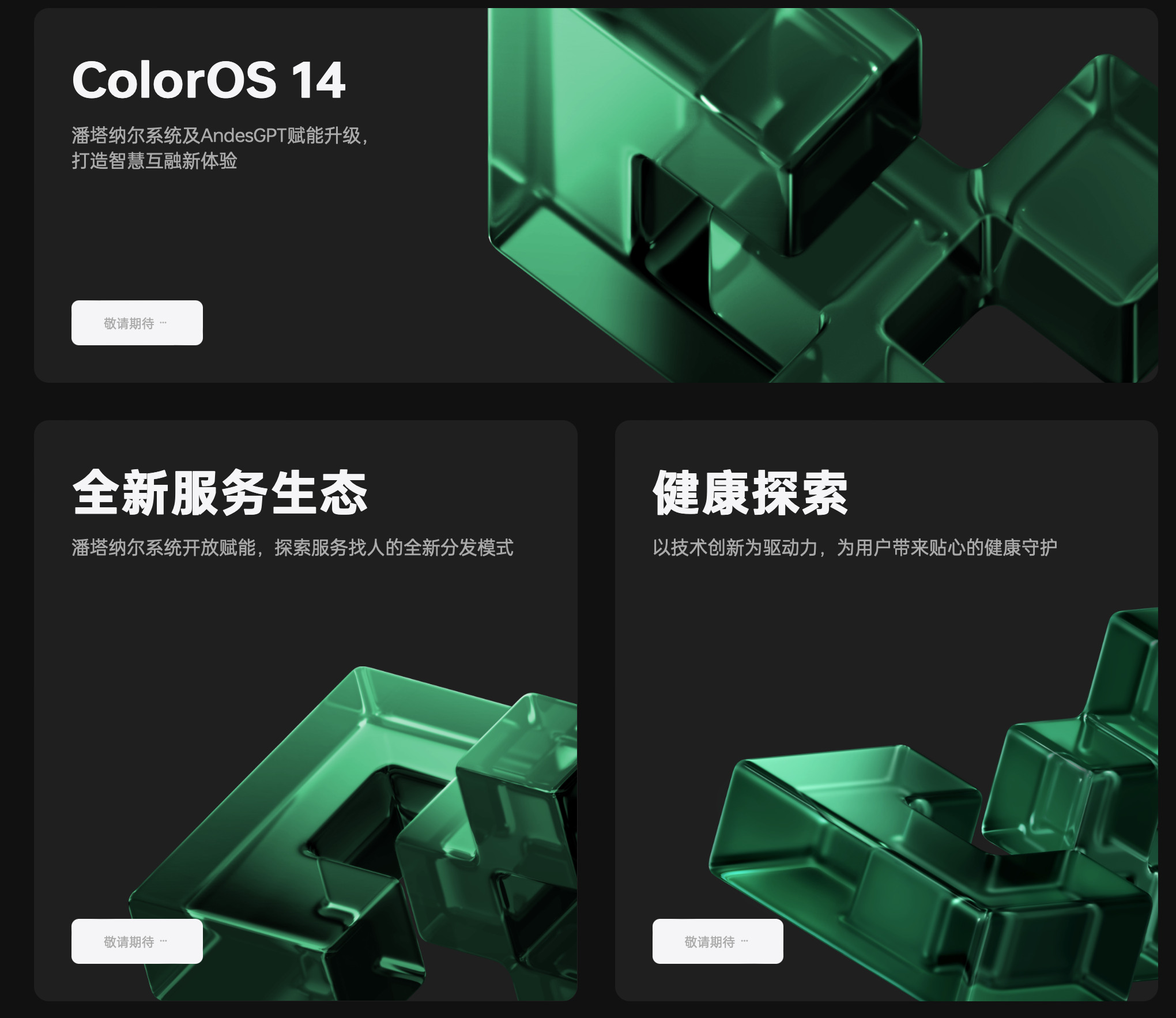
(Photo source: OPPO official website)
In fact, the reason is also very Simple, today’s Android system is indeed very complete and practical, but more than ten years of ultra-rapid development has also left many problems for the Android system. According to industry insiders, the number of codes in the Android system has exceeded 100 million lines, which is so huge. The "code mountain" is difficult for Google to reconstruct and organize. Therefore, when mobile phone manufacturers want to add some new features or functions, they have to face a bunch of tricky codes. Instead of sorting them out bit by bit, it is better to build a new system by themselves.
Of course, this is not all the reasons why mobile phone manufacturers develop their own operating systems. The most important reason is probably to develop their own ecosystem. Although OPPO and vivo are in this The construction of this aspect is weaker than that of Huawei and Xiaomi, but it will definitely focus on developing this in the future.
It is reasonable for Xiaomi to launch its own operating system. After all, Xiaomi is the first to consider developing its own operating system. In 2014, it ranked first in China and third in the world. At that time, Xiaomi was considering developing its own operating system MIOS based on the newly developed Firefox operating system at that time. This was recognized earlier than other mobile phone companies.
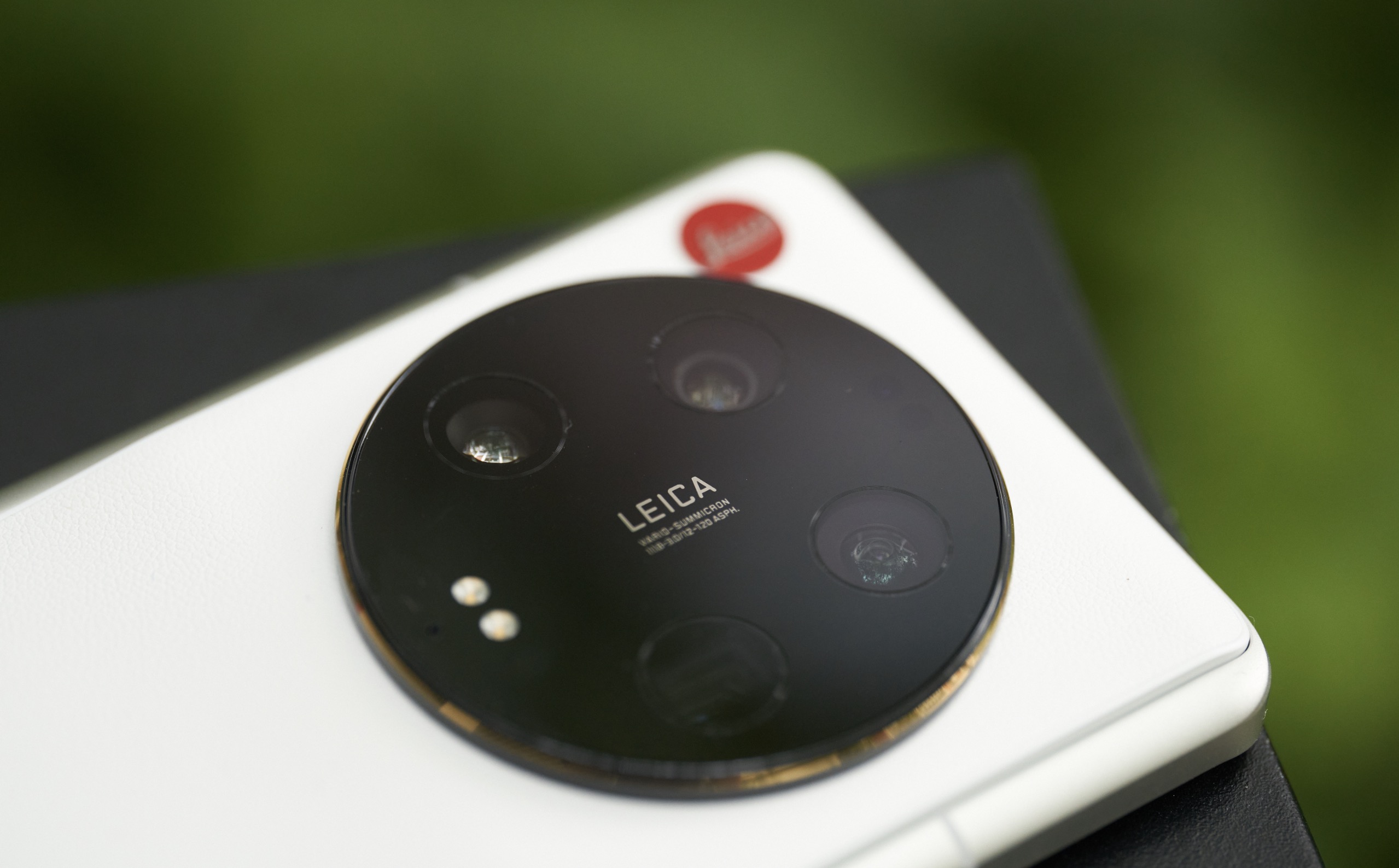
The above is the detailed content of MIUI reaches the end, Xiaomi's self-developed system breaks ground. For more information, please follow other related articles on the PHP Chinese website!

Hot AI Tools

Undresser.AI Undress
AI-powered app for creating realistic nude photos

AI Clothes Remover
Online AI tool for removing clothes from photos.

Undress AI Tool
Undress images for free

Clothoff.io
AI clothes remover

Video Face Swap
Swap faces in any video effortlessly with our completely free AI face swap tool!

Hot Article

Hot Tools

Notepad++7.3.1
Easy-to-use and free code editor

SublimeText3 Chinese version
Chinese version, very easy to use

Zend Studio 13.0.1
Powerful PHP integrated development environment

Dreamweaver CS6
Visual web development tools

SublimeText3 Mac version
God-level code editing software (SublimeText3)

Hot Topics
 1655
1655
 14
14
 1413
1413
 52
52
 1306
1306
 25
25
 1252
1252
 29
29
 1226
1226
 24
24
 Yu Chengdong revealed that Huawei's tri-fold screen mobile phone will be unveiled in September: the price is not expected to be cheap
Aug 20, 2024 am 06:36 AM
Yu Chengdong revealed that Huawei's tri-fold screen mobile phone will be unveiled in September: the price is not expected to be cheap
Aug 20, 2024 am 06:36 AM
On August 19, Hongmeng held a delivery ceremony for the first batch of Xiangjie S9 owners in Shanghai. Huawei executive Yu Chengdong personally attended and delivered the vehicles to the owners. At the scene, a car owner who already owned Wenjie M5, M7, and M9 asked Yu Chengdong when he could buy Huawei's three-fold screen mobile phone. Yu Chengdong responded that it would be available next month. Fenyefenye Previously, real shots of what appeared to be Huawei's three-fold screen phone had leaked on the Internet, causing widespread concern. In the picture, the new phone held by Yu Chengdong shows extraordinary visual impact. Its screen size is far larger than that of conventional folding screen mobile phones. It has a unique design and is not a tablet but is better than a tablet. There is a central hole-punch camera inlaid on the top of the left side, as well as a vaguely visible double-fold design. The side of the phone is suspected to be equipped with a stylus. These clues all point to this
 The best time to buy Huawei Mate 60 series, new AI elimination + image upgrade, and enjoy autumn promotions
Aug 29, 2024 pm 03:33 PM
The best time to buy Huawei Mate 60 series, new AI elimination + image upgrade, and enjoy autumn promotions
Aug 29, 2024 pm 03:33 PM
Since the Huawei Mate60 series went on sale last year, I personally have been using the Mate60Pro as my main phone. In nearly a year, Huawei Mate60Pro has undergone multiple OTA upgrades, and the overall experience has been significantly improved, giving people a feeling of being constantly new. For example, recently, the Huawei Mate60 series has once again received a major upgrade in imaging capabilities. The first is the new AI elimination function, which can intelligently eliminate passers-by and debris and automatically fill in the blank areas; secondly, the color accuracy and telephoto clarity of the main camera have been significantly upgraded. Considering that it is the back-to-school season, Huawei Mate60 series has also launched an autumn promotion: you can enjoy a discount of up to 800 yuan when purchasing the phone, and the starting price is as low as 4,999 yuan. Commonly used and often new products with great value
 Vivo X200: New photos via the Zeiss main camera and periscope telephoto appear to show a leap in quality
Sep 30, 2024 am 06:05 AM
Vivo X200: New photos via the Zeiss main camera and periscope telephoto appear to show a leap in quality
Sep 30, 2024 am 06:05 AM
Product manager Han Boxiao published the first sample photo from the Vivo X200 series on Weibo a few days ago, and now there are two. In the photos below, the first was taken with the 23mm equivalent main camera and the second with the 50 MP telephot
 Huawei will launch the Xuanji sensing system in the field of smart wearables, which can assess the user's emotional state based on heart rate
Aug 29, 2024 pm 03:30 PM
Huawei will launch the Xuanji sensing system in the field of smart wearables, which can assess the user's emotional state based on heart rate
Aug 29, 2024 pm 03:30 PM
Recently, Huawei announced that it will launch a new smart wearable product equipped with Xuanji sensing system in September, which is expected to be Huawei's latest smart watch. This new product will integrate advanced emotional health monitoring functions. The Xuanji Perception System provides users with a comprehensive health assessment with its six characteristics - accuracy, comprehensiveness, speed, flexibility, openness and scalability. The system uses a super-sensing module and optimizes the multi-channel optical path architecture technology, which greatly improves the monitoring accuracy of basic indicators such as heart rate, blood oxygen and respiration rate. In addition, the Xuanji Sensing System has also expanded the research on emotional states based on heart rate data. It is not limited to physiological indicators, but can also evaluate the user's emotional state and stress level. It supports the monitoring of more than 60 sports health indicators, covering cardiovascular, respiratory, neurological, endocrine,
 OPPO Find X8: New leak asserts upcoming smartphone will not have extra camera button
Sep 01, 2024 am 06:33 AM
OPPO Find X8: New leak asserts upcoming smartphone will not have extra camera button
Sep 01, 2024 am 06:33 AM
OPPO is thought to finally bow to peer pressure and switch to aflat-edgeddesign for the successors to theFind X7andX7 Ultra. In fact, Apple's influence is thought to be so overwhelming that the devices will adopt one more bleeding-edge upgrade also t
 Apple and Huawei both wanted to make a buttonless phone, but Xiaomi made it first?
Aug 29, 2024 pm 03:33 PM
Apple and Huawei both wanted to make a buttonless phone, but Xiaomi made it first?
Aug 29, 2024 pm 03:33 PM
According to a report from Smartprix, Xiaomi is developing a buttonless mobile phone codenamed "Suzaku". According to this news, this mobile phone codenamed Zhuque will be designed with an integrated concept, use an under-screen camera, and be equipped with Qualcomm Snapdragon 8gen4 processor. If the plan does not change, we are likely to see its arrival in 2025. When I saw this news, I thought I was back in 2019 - at that time, Xiaomi released the Mi MIX Alpha concept phone, and the surround-screen button-less design was quite amazing. This is the first time I have seen the charm of a buttonless mobile phone. If you want a piece of "magic glass", you must first kill the buttons. In "The Biography of Steve Jobs", Jobs once expressed that he hoped that the mobile phone could be like a piece of "magic glass".
 OPPO Find X8 Ultra core configuration exposed! Snapdragon 8 Gen4+ Extra Large Battery
Aug 22, 2024 pm 06:54 PM
OPPO Find X8 Ultra core configuration exposed! Snapdragon 8 Gen4+ Extra Large Battery
Aug 22, 2024 pm 06:54 PM
On August 22, a digital blogger revealed some core configuration information of OPPO Find X8 Ultra. According to the exposed content, this high-end model will be equipped with Qualcomm’s latest Snapdragon 8Gen4 mobile platform, equipped with a 6000mAh ultra-large capacity battery, and supports 100W wired fast charging and 50W wireless fast charging functions. Appearance design There is currently no specific design information about OPPO Find X8 Ultra. But the real picture of the standard version of OPPO Find X8 has been exposed on the Internet. Appearance of FindX8 Judging from the exposed photos, the rear camera module of OPPO FindX8 adopts a square design with a certain degree of curvature at the four corners, giving a more rounded feeling. In addition, the machine adopts a direct
 Oppo Find X8 design looks like a cross between Apple iPhone 16 Pro and OnePlus Open in early images
Sep 28, 2024 am 06:04 AM
Oppo Find X8 design looks like a cross between Apple iPhone 16 Pro and OnePlus Open in early images
Sep 28, 2024 am 06:04 AM
Historically, Oppo has refreshed its flagship 'Find X' series in late winter or early spring, save for the original Find X that it announced in June 2018. To that end, the Find X7 and Find X7 Ultra are barely more than six months old at this point. H



